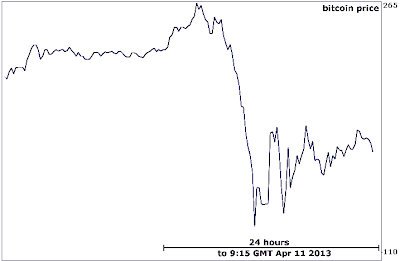The percentage game of hard selling

I returned with ten tiny pages of notes and a squeezy red oil barrel from the advfn/Tom Winnifrith UK Investor Show at ExCeL. Winnifrith may as well have called it
Dolly the Show, so hard has he worked to
clone Master Investor, the event he founded. The show was as enjoyable as always, with great insights from the speakers. If it wasn't free, I'd certainly pay to go again.
The speakers and company stands were just as I expected from previous years. The functional squareness of an ExCeL hall was not - I missed the echoey cavern of the
wrought-iron and glass building in Islington, once the Royal Agricultural Hall.

Standing out from the rag bag of early stage oil explorers and Dirty Harry ("do you feel lucky?") miners were
Stockopedia and
UKIP. The latter now feels the need to include
non-racist in its proclamation, which shows how concerned they are with this perception. Their stand was crowded round with non-racist libertarian admirers when leader
Nigel Farage was there. He's an outstanding speaker too, if his populist demagoguery doesn't make you too queasy. He's also speaking at
Master Investor early doors if you want to catch him on 27 April. Here's a taste of his theme on
youtube.
"I never imagined that the Troika would resort to the level of common criminals and steal money from people's bank accounts in order to keep propped up this total failure that is the Euro."

Ed Croft was giving non stop demos of
Stockopedia's share screeners. His energy was like the sun's gravity, pulling in listener after listener. Damn his easy charm and good looks.

There was one stand which caused me to say "
WTF are they doing here?",
Emerald Knight. I received an email ad of theirs three years ago. They were promoting a carbon credit scheme in the Amazon with a
fixed 30% return on investment. I'm pretty greedy but 30% seems too good to be true. If there was a moderate-to-high risk opportunity paying 30% PA then
the investment banks would be all over it. They were the guys don't forget who thought subprime mortgage bonds paying 0.25% over T-notes were a monster deal.
When I threw this truly Amazonian money-making opportunity open to the
cynics on the the Motley Fool boards it prompted a vigorous debate.
There's another discussion
here too and a
blog.
The FSA has said this about
carbon schemes sold to the public:
"Trading on carbon credit markets requires skill and experience...
Beware that VERs certificates are often labelled as ’certified‘, but
this certification is voluntary and involves a wide range of bodies and
different quality standards that are not recognised by any UK
compensation scheme...
Even if a firm involved in the sale or trading of carbon credits is
authorised by us, as we do not regulate carbon credits you will not have
access to the FOS or FSCS [protection schemes]."
After he clocked my glance at the stand, the
Emerald Knight salesman appeared at my side as though he's been teleported and started his pitch. He was
by far the best (er, most effective) representative of any company I spoke to. I dead batted away his first offering of a bamboo plantation in Nicaragua
"My right arm merely hovered, untouched by human contact"
Sure I said, I'll charter a Black Hawk plus ten Marines and check it out next week. After 5 minutes I'd really had enough of feigning interest and thought he might notice my choking on the blood from biting my lip. I applied the handbrake of a thank-you and a handshake. My right arm merely hovered, untouched by human contact. Mr rep then pitched the admittedly much more attractive idea of being a Brazilian landlord.
My dangling limb was an embarrassment though, so I made a tactical withdrawl and informed him I wasn't interested in South American social housing either.
A very decisive lunge by me clinched the deal of a handshake the second time.
Although his first refusal to shake my hand was pretty rude, in the
percentage game of hard selling it was a price worth paying to allow him a second pitch. Skillful, no?

Six months ago I'd had an email from another company offering oddball investments,
Capital Alternatives. Sure enough they had a stand as well. Here's
some discussion of the African land they were offering me. Money Observer ran a detailed
piece on a problem with a hotel share scheme in Slovenia.
I'm not saying that you would necessarily lose money investing via Emerald Knight or
Capital Alternatives. I am saying that their schemes are likely riskier than is apparent to the naive. I'm also surprised that advfn and Tom Winnifrith took their shilling but that merely shows up my own naivete.
I'll follow up with what I learned from the speakers. Paul Scott has written two excellent pieces already:
Pt1 and
Pt2.
 We never got 3D, haptic display, keyboard cover or a bezel-less screen that pundits have previously predicted. Maybe this time. But what about some really radical advances?
We never got 3D, haptic display, keyboard cover or a bezel-less screen that pundits have previously predicted. Maybe this time. But what about some really radical advances? Not a half-assed effort like the Sony tablet P (right) where you still have a
bezel and an air gap between the two
Not a half-assed effort like the Sony tablet P (right) where you still have a
bezel and an air gap between the two 







+14-6-13.jpg)
+14-6-13.jpg)






























